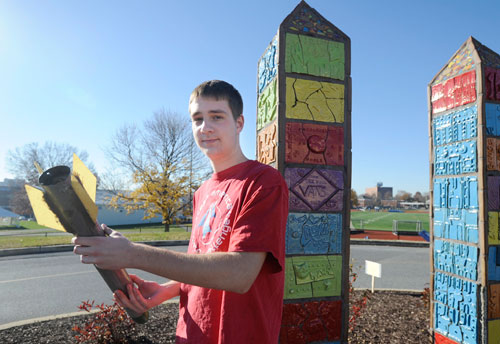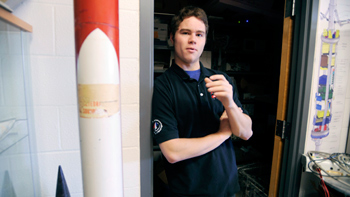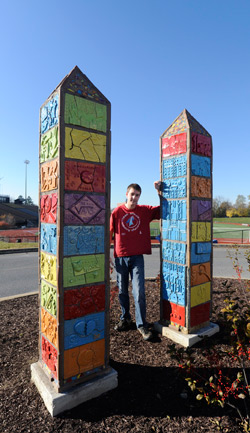 There are a lot of things that aren’t rocket science, including, well, rocket science.
There are a lot of things that aren’t rocket science, including, well, rocket science.
“We actually use that phrase a lot,” says Jordan Franssen, a freshman at Penn State University majoring in computer science.
“Knowing how rockets work though, it’s really not as complicated as everyone makes it seem.”
In other words, even rocket science isn’t rocket science to future rocket scientists, although at the high school level it does sometimes involve raw eggs. (More on that later.)
Franssen should know what he’s talking about. With an eye toward a job in the aerospace industry, Franssen could be considered the future of rocket science.
“My first year seminar at Penn State is an aerospace seminar, and the teacher really stresses the importance of a computer science background in the aerospace industry,” says Franssen. “I feel with a solid computer science background I’ll be able to do a lot in the aerospace industry.”
Franssen, along with fellow rocket enthusiast Nate Bernhardt, came out of the internationally recognized Penn Manor Rocketry Club program at Penn Manor High School in Millersville. In 2009, the Lancaster County squad won the national Team America Rocket Challenge (TARC) as well as the international Transatlantic Rocketry Challenge and the title of “best student rocketeers in the world.”
 And they’ve had a blast–or in this instance maybe a blastoff–learning about rocket science along the way. They build model rockets and study things like how long it’s in the air and what affects it on the way down.
And they’ve had a blast–or in this instance maybe a blastoff–learning about rocket science along the way. They build model rockets and study things like how long it’s in the air and what affects it on the way down.
But now the duo has advanced to the next stage in life and each is pursuing a different path. Franssen is still aiming for a career in rocket science–also called aeronautics engineering–while Bernhardt is less committal and leaning toward something completely different–like wine-making.
“Everybody keeps asking me if I’m going to study math and science,” says Bernhardt, whose starts school in January at Harrisburg Area Community College (HACC) after sitting out and working for half a year before being laid off. “My family makes a hobby of making homemade wine and they teach you at HACC how to do that. It’s really not related to math and science at all. I would love to get into aerospace but as of right now, I’m really not committed to any one thing.”
For the past several years though, these guys were among the best of the best budding rocketeers to come out of the Penn Manor rocketry program.
“I wasn’t originally interested in rocket science,” says Franssen.
“Some of my friends (including Nate) asked me to join the rocket club in eighth grade. I was just interested in it as a way to hang out with my friends.
“But as I started learning more and more about how rockets work and how to build model rockets. It turned out to be a problem-solving kind of experience. I really enjoy using my mind for things like that.”
As the Franssen/Bernhardt age group advanced through the Penn Manor ranks, it became more apparent that these guys and some of their classmates were the real deal when it came to rockets.
 The culmination was a big senior year in 2009-2010, starting with the TARC competition in Manassas, Va. In that competition, 669 teams put in qualification scores. Of those, the top 100 other teams from across the country advanced to the nationals. There, the rocket scientists were given a set of perimeters for their launch: height of the rocket, flight time and carrying and delivering a fragile payload–like a raw egg.
The culmination was a big senior year in 2009-2010, starting with the TARC competition in Manassas, Va. In that competition, 669 teams put in qualification scores. Of those, the top 100 other teams from across the country advanced to the nationals. There, the rocket scientists were given a set of perimeters for their launch: height of the rocket, flight time and carrying and delivering a fragile payload–like a raw egg.
Each team launched once, then the top 20 launched again the same day. The team with the best combined score won the competition.
“It’s not like we were making a rocket that’s taking people to the moon,” says Bernhardt. “We’re just shooting rockets up carrying eggs. TARC encourages people my age to get involved in math and science in a fun way. We never thought back in the day when we started messing around with rockets that it would take us where it did.”
After taking top honors at the nationals (a middle school team from Penn Manor took second place in the competition), Franssen,
Bernhardt and teammates Brendan Stoeckl and Tyler Funk traveled to London to compete against two other teams, from Britain and France, in the Transatlantic Rocketry Challenge. And again, the team took home the gold.
“I definitely feel better about the national competition because we were flying off against many, many teams whereas the international competition was against just two others,” says Franssen. “To be perfectly honest, though, a lot goes into it that is just luck.”
 Even after Franssen and Bernhardt graduated from high school, their exploits were still being recognized. In October, Penn Manor rocketry coach Brian Osmolinski and his team were among those invited to visit the White House for a science fair. And to meet President Obama. (Although Stoeckl and Funk made the trip, only Franssen, Bernhardt and Osmolinski were chosen to meet Obama.)
Even after Franssen and Bernhardt graduated from high school, their exploits were still being recognized. In October, Penn Manor rocketry coach Brian Osmolinski and his team were among those invited to visit the White House for a science fair. And to meet President Obama. (Although Stoeckl and Funk made the trip, only Franssen, Bernhardt and Osmolinski were chosen to meet Obama.)
“We set up our display and we brought our rocket and trophy and a little slideshow,” says Bernhardt. “He (Obama) spent maybe five minutes at each presentation. When he came over to us, he shook all our hands. Jordan explained aspects of our rocket and then I explained aspects of the competition and our trip (to London).
“After I told him we beat the French and the British teams, he shook my hand one more time. He seemed pretty excited, or as excited as he’s going to get.”
“He seemed really interested in what everyone was doing,” says Franssen. “He was really stressing to the press and others that were there to get schools to do more of these types of things and to compete globally in putting the U.S. on top again.”
Franssen maintains, however, that although rocket science is an “exact challenge,” it’s also a learning process.
“Honestly, it’s a lot of trial and error,” he says. “It’s like riding a bike. We keep launching our rockets over and over and we slowly learn what works.
“Eventually, we get to the point where we can go out on any given day–like the international competition or the national competition–and we see what the conditions are like, we look back at our notes and we know what our rocket is going to do.
“From there, it’s just setting it up the right way.”
Mike Morsch is a veteran Greater Philadelphia journalist, die-hard Phillies fan and an all-around swell guy. Send feedback here.
Sign up here to receive Keystone Edge for free in your inbox every week.
PHOTOS:
Nate Bernhardt with rocket outside Penn Manor High School.
Jordan Franssen, at Penn State University’s Rocket Club in the Electrical Engineering facility in State College.
The door is open for Franssen to pursue a career in aeronautics engineering.
Bernhardt, hanging out at his alma mater, may pursue a career in winemaking.
All photographs by Brad Bower
